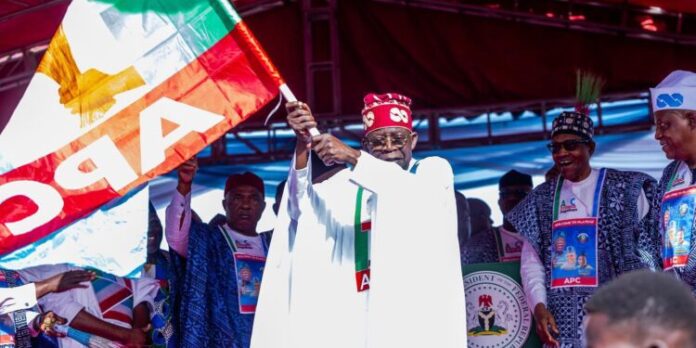By Izunna Okafor
The Independent National Electoral Commission (INEC) has declared the All Progressive Congress (APC) candidate for the 2023 general election, Bola Tinubu, the winner of the 2023 Nigeria’s presidential election.
The declaration was made in the early hours of Wednesday, barely four days after the keenly contested election, despite objections by many Nigerians and opposition parties who insist with evidences that the electoral process was marred by many irregularities, and therefore called for the suspension of further the results collation and a repeat of the election.
According to INEC during the result declaration, Tinubu garnered 8,794,726 million votes, ahead of main opposition challenger Atiku Abubakar of the People’s Democratic Party (PDP) who polled a total of 6,984,520 million votes, while Peter Obi of the Labour Party (LP) followed far behind with a total of 6,101,533 million votes.
Nigerian electoral law says a candidate can win by getting more votes than their rivals, provided they get 25% of the vote in at least two-thirds of the 36 states and the federal capital Abuja, which Tinubu did.
According to the INEC, Tinubu also scored over 25 per cent of the votes cast in 30 states, more than the 24 states constitutionally required. The Commission declared that Mr Tinubu won the election in Rivers, Borno, Jigawa, Zamfara, Benue, Kogi, Kwara, Niger, Osun, Ekiti, Ondo, Oyo and Ogun states; Atiku won in Katsina, Kebbi, Sokoto, Kaduna, Gombe, Yobe, Bauchi, Adamawa and Taraba states. He also won in Osun, Akwa Ibom and Bayelsa states; while Mr Obi won in Edo, Cross River, Delta, Lagos, FCT, Plateau, Imo, Ebonyi, Nasarawa, Anambra, Abia and Enugu states.
Mr Rabbiu Kwankwaso won in only Kano State
The INEC Chairman, Yakubu said a Certificate of Return for the President and Vice President will be presented by 3 p.m. on Wednesday at the National Collation Centre, Abuja.
Recall that the opposition parties rejected the results as the product of a flawed process, which suffered multiple technical difficulties owing to the introduction of new technology by INEC, and on Tuesday called on its chairman, Mahmood Yakubu, to resign.
“The results being declared at the National Collation centre have been heavily doctored and manipulated and do not reflect the wishes of Nigerians expressed at the polls,” they said in a joint statement.
The INEC, however rejected the charge, and maintained that “There are laid down procedures for aggrieved parties or candidates to follow when they are dissatisfied about the outcome of an election.”
The election was said to have been marred by violence in places, although not yet on the scale of previous ones.
The INEC had promised to upload results from each polling unit to its website but most units were unable to do so immediately, and thousands of results had yet to be uploaded.
That meant results had to be collated manually inside ward and local government counting centres as in previous polls, which observer missions also criticised as the result of poor planning.
Tinubu asked voters to elect him on his track record during his two terms as Lagos state governor at the turn of the century, during which he reduced violent crime, improved the city’s traffic jams and cleaned up rubbish.
The 70-year old has, however, sometimes appeared frail in public, slurring his speech and answering questions with platitudes, and skipping several campaign events, leaving some to doubt how effective he would be.
On the other hand, Obi’s campaign attracted young people and urban, more educated voters fed up with corrupt politics of the past, the two parties that have represented it since the end of military rule in 1999 and old men who have tended to dominate them.







